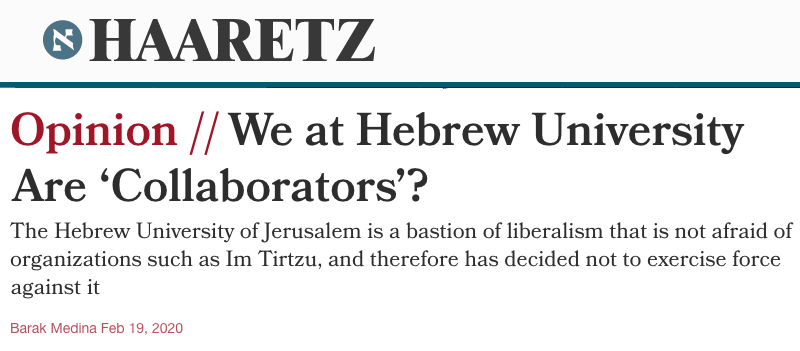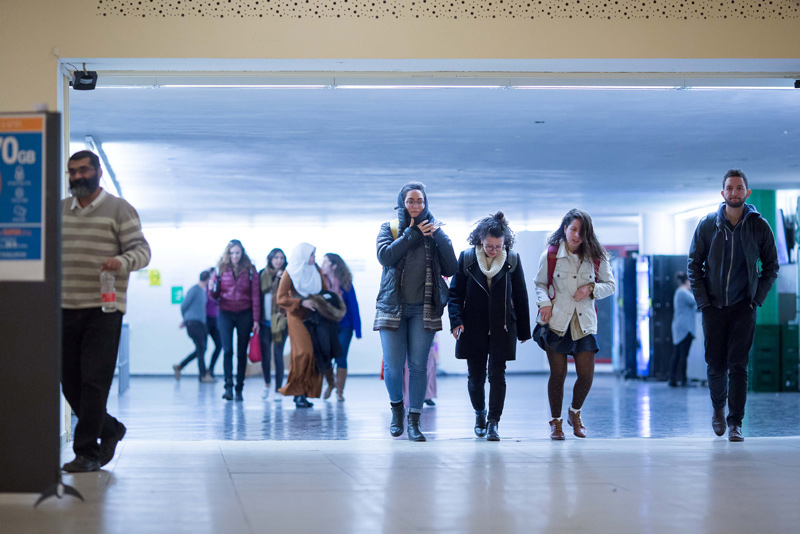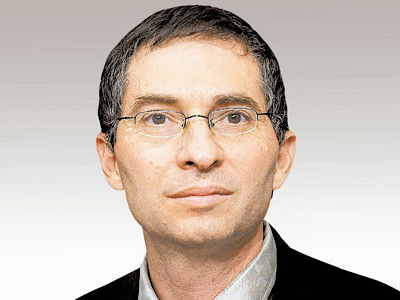

According to an editorial in this newspaper, the Hebrew University’s decision not to deny eligibility for a course exemption to students who engage in social welfare activity under the umbrella of the right-wing Im Tirtzu organization is “A lesson in collaboration” (Haaretz, February 16). In the opinion of the editorial board, the decision is “moral bankruptcy” which reflects lack of understanding or cowardice.
Several years ago, when I was proposed as a candidate for a judgeship, Im Tirtzu acted to prevent my appointment, because years earlier I signed a manifesto calling to permit students to commemorate what they call the Nakba. Im Tirtzu accused me of anti-Zionism, while confusing support for the freedom to express a specific opinion with support for the opinion itself.

It is surprising to discover that the editors of Haaretz are making a similar mistake, and attributing to the university collaboration with Im Tirtzu because we thought there is no reason to exercise power against it, and preferred an approach whose purpose is education for tolerance and human rights.
The Hebrew University is a bastion of liberalism. It is a self-confident institution, which is not afraid of organizations like Im Tirtzu. Our job is not only to engage in teaching and research, but also to educate the students for tolerance, public engagement and activity for social improvement. At the Hebrew University students can demonstrate on any issue, without any need to request a permit.
We do not turn a blind eye to intolerant opinions, but the battle against them is carried out by means of persuasion, by encouraging the university community to speak out – not by the use of force. We are in the midst of a process for starting a program called Avnei Pina / Cornerstone Program, in which every student will participate in at least one course about basic principles of liberal democracy.
Education to respect the other is achieved only by serving as role models, not by silencing those who opinions are mistaken and even unacceptable.
From here to the issue that aroused the anger of the Haaretz editorial board. A law passed in the Knesset in 2018 requires granting two academic credits for social and communal activity. The attempts by the academic community to convince the MKs to refrain from passing the law were unsuccessful, and we were required to implement it.
According to an arrangement decided on by the Hebrew University, an organization that is interested in recognition for the above-mentioned exemption for its volunteers can send its reasoned request to the committee authorized to discuss the issue.
Activity in organizations connected to a political party will not be approved. In light of the basic difficulty of deciding which organizations will be considered political and which will not, the committee examines mainly the nature of the concrete activity for which recognition is requested, without trying to define the overall nature of the organization requesting it.
The committee has adopted a liberal approach, in the belief that students should be allowed as much freedom of activity as possible in their choice of volunteer activities. Accordingly, about 140 organizations from a broad range of fields were approved, which means that social welfare activity in their context entitles the volunteers to the above-mentioned exemption, and about 1,300 students are volunteering this year in those organizations.
Im Tirtzu’s request was approved after the organization declared that it was offering assistance to “Israel Defense Forces soldiers, an elderly population, residents of Jerusalem (Jews, Arabs, secular, religious and ultra-Orthodox), the needy et al.” Like the volunteers in every other organization, at the time when the request for the exemption is submitted, every student will have to declare the nature of their activity, and the exemption will be approved only if it meets the restrictions that were determined.
Im Tirtzu’s request was approved despite the strong reservations of the university administration regarding many aspects of the movement’s activity. The decision is based only on an assessment that no danger which justifies restriction of freedom of activity is expected to result from the activity of the students requesting the exemption.
The paradox of tolerance – in other words, the proper attitude from a liberal point of view toward those who do not respect the other and act to deny his rights – has given rise to a variety of opinions in legal systems and among philosophers. An important consideration is how the policy that is adopted will affect public opinion. I believe that the clear erosion of public support for protecting freedom of expression can be attributed to a growing trend in Israeli law to approve restrictions on this right.
Although at first, justified restrictions were imposed on freedom of expression, such as the prohibition against incitement to racism, the side effect of the broad restrictions has been public support for unjustified harm to freedom of expression too.
In light of that, it is justified to restrict only statements and organizations that pose a particularly serious risk, one that cannot be neutralized without restricting individual freedoms. The risk represented by awarding academic credits to those who volunteer for social welfare activity of the type described above in the context of Im Tirtzu is not among the types of risks that justify undermining the freedom of activity of students to choose where to volunteer, and their right to express identification with the values – which I consider unacceptable – of this movement.
It is possible of course to believe that the university administration should not be tolerant of organizations such as Im Tirtzu. But that does not lead to the conclusion that an opposite approach is unreasonable and that it reflects cowardice or collaboration with this organization.
For example, in 1985, at the height of the threat posed by the disgraceful incitement to racism espoused by Rabbi Meir Kahane (whose philosophy differed from that of Im Tirtzu), Justice Aharon Barak ruled that the Broadcasting Authority’s decision not to air any interviews with him was void due to Kahane’s right to freedom of expression and an assessment of the risk resulting from broadcasting the interviews.
We can level criticism against Barak’s approach, which over the years became a minority opinion, but nobody would dream of claiming that his opinion reflects “moral bankruptcy,” and that Barak acted as a “collaborator” with the Kach movement or that his approach reflected fear of it. Exactly the same is true in the present instance.
Prof. Medina holds the Justice Haim Cohen Chair in Human Rights, and is the rector of the Hebrew University.